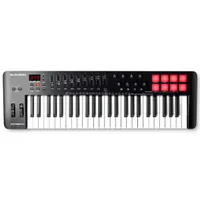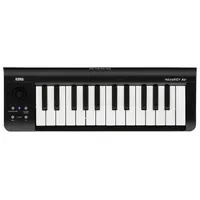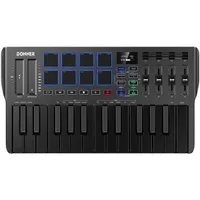Best cheap MIDI keyboards 2025: Inexpensive MIDI controllers starting at just £39/$49
Start making music for less with our selection of affordable MIDI keyboards from Arturia, Akai, Nektar, Novation, and more
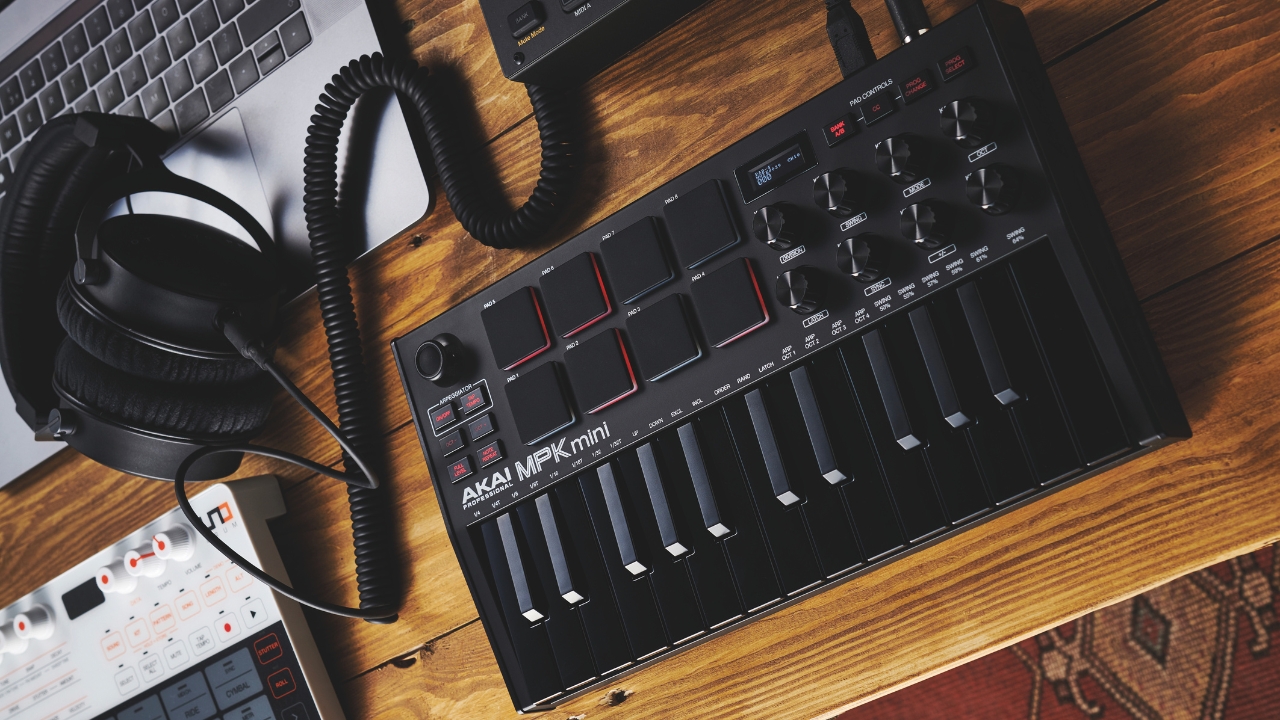
Of all the reasons we tell ourselves we can't record our own music, not having enough budget for the right gear definitely comes up quite often. In reality however, making music has never been more accessible, and armed with just a computer and one of the best cheap MIDI keyboards you can start creating songs for relatively little outlay.
A MIDI keyboard has become a crucial part of music in the modern age, allowing you to control a huge variety on instruments in your DAW, as well as the functions of the DAW itself. This means you can massively speed up your workflow, playing your melodies and beats directly into your DAW and editing them later down the line. With a compact option and a laptop, you can take your music-making anywhere you go too.
For us, the best cheap MIDI keyboard you can buy right now is the Arturia MiniLab 3. It's feature-rich, and more importantly, has some of the best build quality we've ever seen at such a low price point. If you're new to MIDI keyboards, then have a look at the Akai MPK Mini Mk3, which has a very complete feature set that makes it a great starting point on your music-making journey.
Further down this guide you'll find our exhaustive how to choose guide, which is perfect for beginners who just making their first moves in the music game. We've also got an in-depth FAQs section which answers loads of common questions. If you're ready to see the most affordable MIDI keyboards available right now, then keep on scrolling...
Our top picks
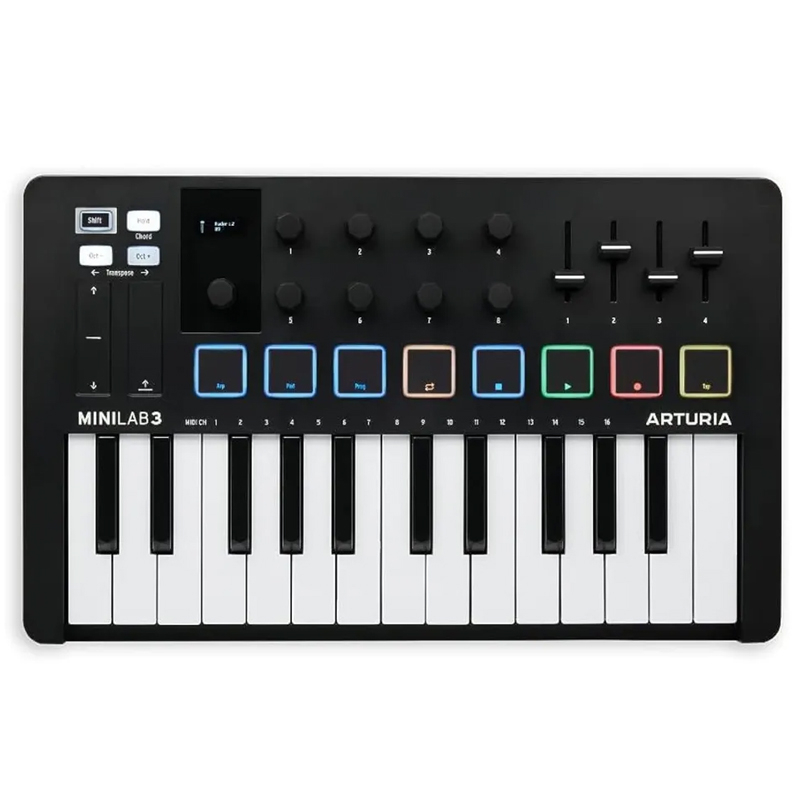
With its slick user interface and impressive build quality, the Arturia MiniLab 3 is a lot of MIDI keyboard for relatively little money. Available around the $100 mark, it delivers pressure sensitive pads and excellent DAW integration.
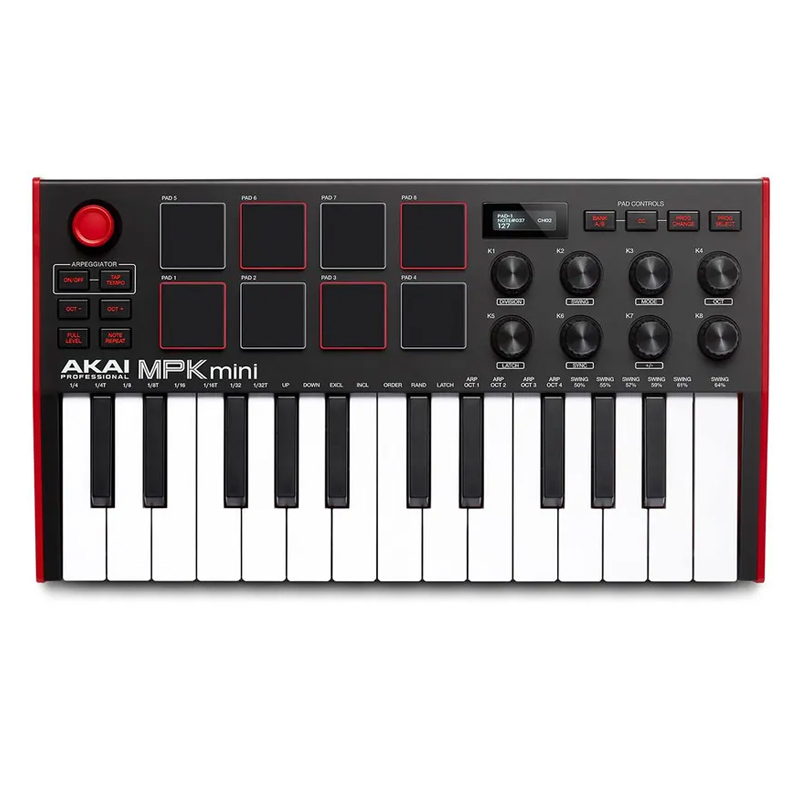
The Akai MPK Mini is great for beginner home studio owners. It covers a lot of bases when it comes to controlling a DAW session with 25 keys for playing melodies, eight large pads for creating beats, and eight rotary knobs which can be assigned to control parameters within your software.
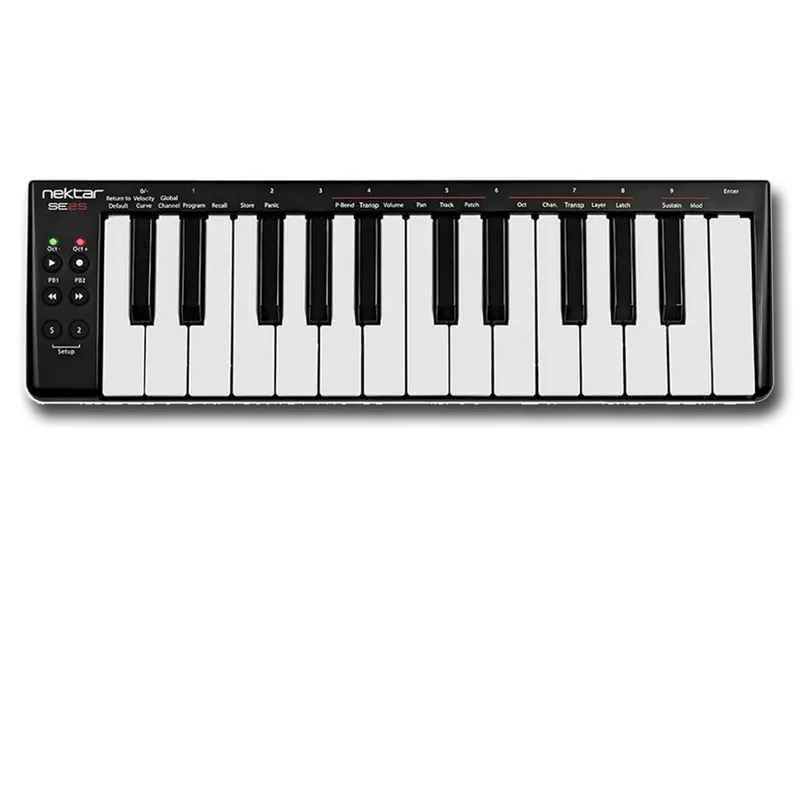
If you need something small for a busy desktop or your always on the move, the teeny-tiny Nektar SE25 is a great option. It manages to pack some useful extra features into its compact footprint, so you don't have to sacrifice functionality.
Best overall
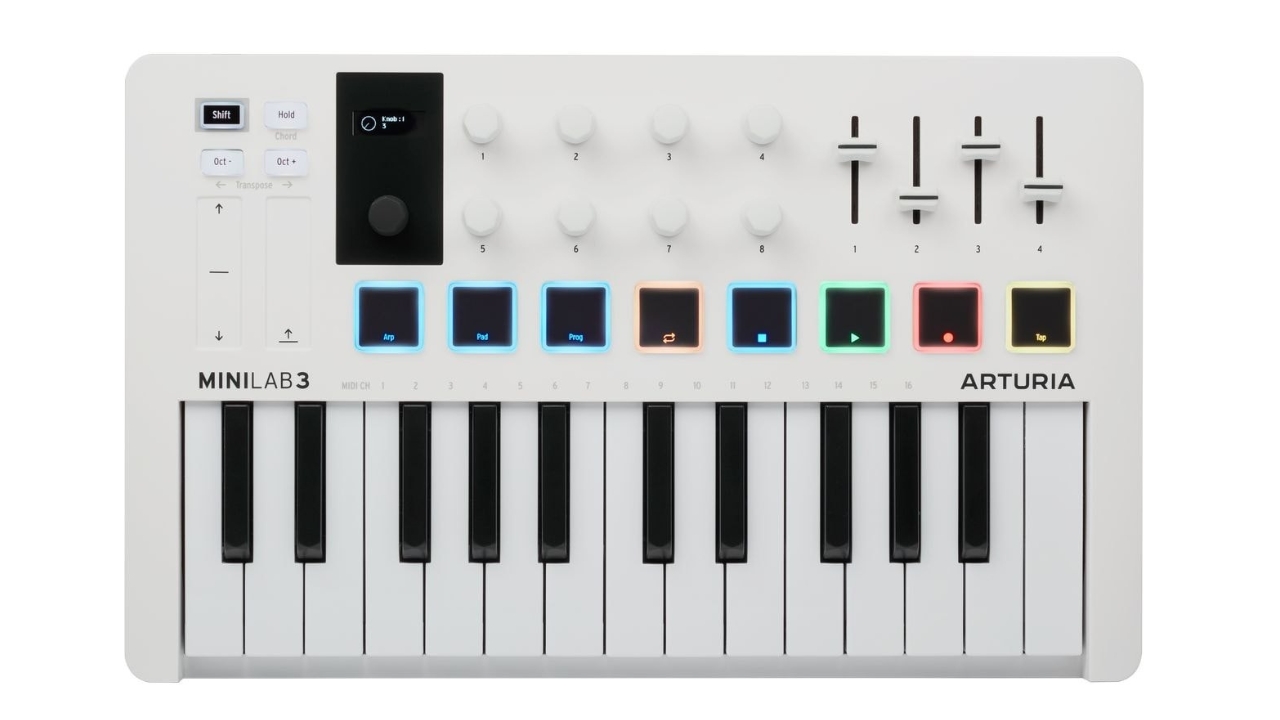
Specifications
Reasons to buy
Reasons to avoid
✅ Buy if you want the best overall: For us, the MiniLab 3 remains the best all-rounder MIDI keyboard if you're on a tight budget, with impressive build quality and a 5-year guarantee.
❌ Avoid if you already own MiniLab 2: There's not all that much difference between this and version 2, so it's probably not worth the upgrade if you already have a MiniLab.
MiniLab 3 is the latest incarnation of Arturia’s 25-mini key MIDI controller keyboard. Available in black and white versions, it has the same footprint as the MkII and weighs the same, but now has a slicker overall look. The build quality is impressive; it’s made with 50 percent recycled plastic and has a 5-year guarantee.
The MiniLab 3 keyboard has an excellent positive action that’s consistent across the keys with minimal mechanical noise. The pitch bend and mod wheel are the touch-sensitive slider type and these work incredibly well.
It’s also great to see polyphonic aftertouch generated by the pads, and this dovetails with many patches in Arturia’s Analog Lab (the Intro version is in the software bundle). Integration with this is great and there are also extensive DAW control features.
If you already own a MiniLab MkII and are thinking of upgrading, you’ll need to weigh up the extra options, but for new users, MiniLab 3 is definitely one of the best keyboards in its class and offers fantastic value and a great software bundle.

"The MiniLab 3 keyboard has an excellent positive action that’s consistent across the keys with minimal mechanical noise. The pitch bend and mod wheel are the touch-sensitive slider type and these work incredibly well. It’s also great to see polyphonic aftertouch generated by the pads and this dovetails with many patches in Arturia’s Analog Lab (the Intro version is in the software bundle)."
Read more: Arturia MiniLab 3 review
Best for beginners

Specifications
Reasons to buy
Reasons to avoid
✅ Buy if you're a beginner: With a very complete set of features and low cost, MPK Mini Mk3 is an excellent choice for the first-time producer, giving you keys for melodies and pads for your beats.
❌ Avoid if you prefer a mod wheel: The thumbstick control for your mod wheel and pitch bend has many detractors, so avoid if you prefer a more traditional method of control.
The older Akai MPK Mini (Mk2) was almost universally loved because it gave home studio owners the chance to cover a lot of bases when it came to controlling a DAW session.
You had 25 keys for playing melodies, eight large pads for creating beats and eight rotary knobs which could be assigned to control parameters within your software. There was a feeling that it was getting a bit old in the tooth though, which is why Akai introduced the new MPK Mini Mk3.
Truthfully, there aren’t a tonne of wholesale changes, but then there weren’t any required. What you get instead is endless encoders, improved pads and a new OLED screen so you can see what you’re controlling. It’s a small update, for sure, but one that keeps the MPK Mini way out in front of its peers.

"The MPK mini mk2 had good velocity and pressure sensitive pads, but the ones in the mk3 are the same super tactile design found in the MPC series hardware. So, the velocity response is excellent when playing beats, but you’ve also got great pressure performance when playing sustained sounds. They also have aftertouch (either channel and polyphonic can be selected), which is great for eliciting more organic performances from suitably equipped synth patches."
Read more: Akai MPK Mini Mk3 review
Best mini MIDI keyboard
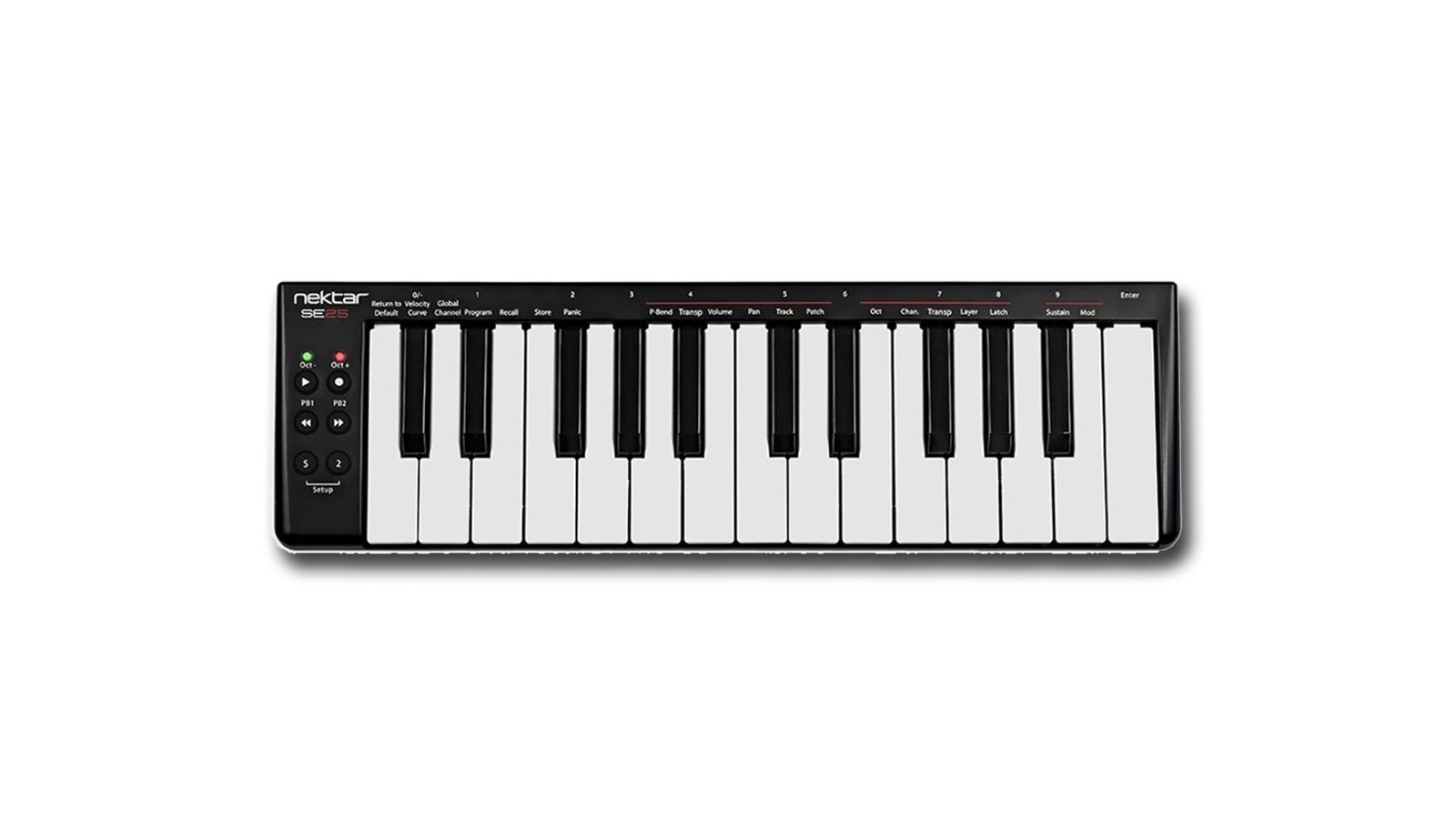
Specifications
Reasons to buy
Reasons to avoid
✅ Buy if you're a travelling musician: With its tiny size, the SE25 is perfect for chucking into a backpack and making music on the go.
❌ Avoid if you have a permanent setup: Some of the deeper functions here will have you manual diving, so if you tend to make music in one place there are better options here.
If you’re someone who’s always making music on the move, a pint-sized MIDI controller keyboard that’ll fit in a laptop bag is an essential item. Nektar’s SE25 demonstrates firmly that features and playability needn’t be sacrificed for the sake of size and portability.
Only outpriced in the budget MIDI controller stakes by the ever-so-slightly cheaper Akai LPK25 (which doesn’t provide any form of DAW integration), Nektar’s new pocket powerhouse represents incredible value for money.
Where else can you get Nektar DAW integration for Bitwig, Cubase, Garageband, Logic, Nuendo, Digital Performer, Mixcraft, Reason, Reaper, Sonar and Studio One for a measly 44 quid?

"The Nektar SE25 keyboard itself is playable, not the greatest experience for 'proper' players of course, but when you're on the move this will be all you need: a means to input beats and notes with velocity sensitivity."
Read more: Nektar SE25 review
Best for Ableton users
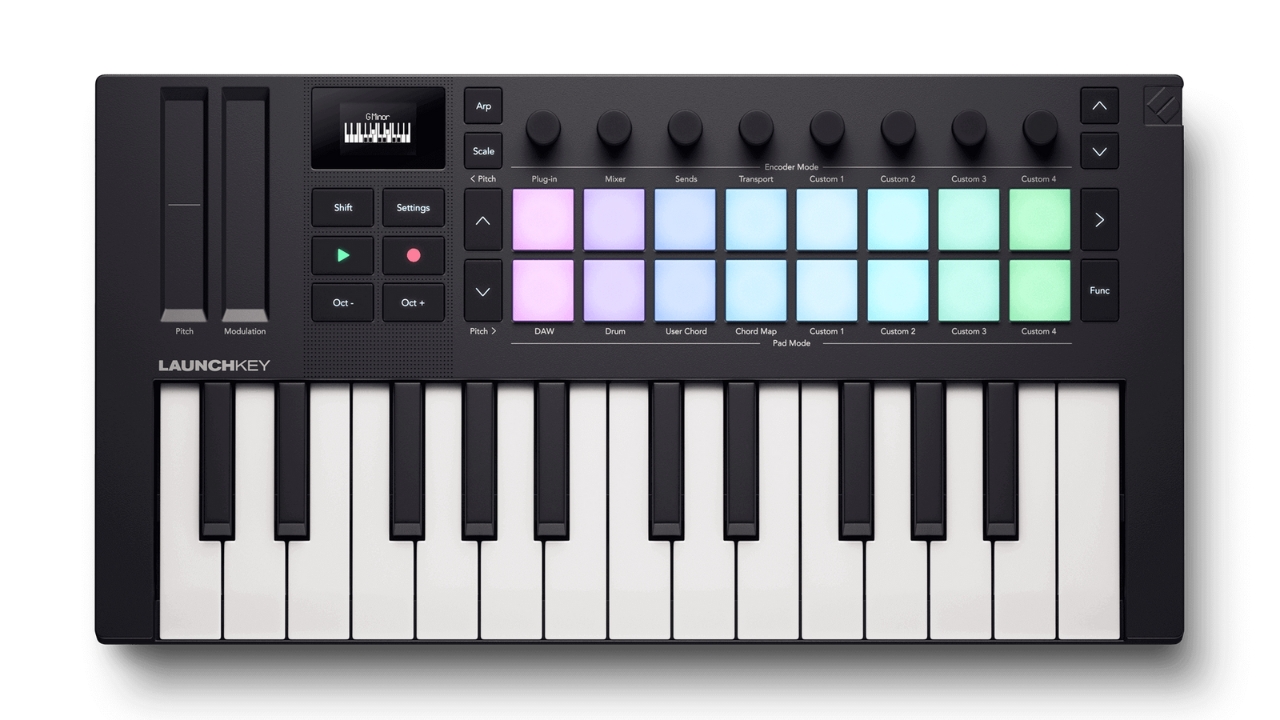
Specifications
Reasons to buy
Reasons to avoid
✅ Buy if you're using Ableton: Providing completely native Live integration, this MIDI controller is ideal for musicians using Ableton to create their music.
❌ Avoid if you don't like mini keys: Naturally as a small controller the keys are less playable than larger ones.
We loved the Novation Launchkey Mini Mk3 so were super excited to get our hands on version 4. As you might expect, it's an absolute gamechanger for anyone using Ableton Live, and combined with fantastic build quality and plenty of great features, the 25-key version is an absolute bargain.
The OLED display is super useful, and we especially love that in chord mode it shows you what chord you're playing and the notes involved too. It also displays information like track names, device names, parameters, depending on what your currently interacting with.
The Ableton integration is immediate, so from the moment you plug in you can control your Session View with the pads. Alternative functions are available by holding the shift key, giving unrivalled tactile control over Ableton alongside regular transport controls just to the left. Add in a built-in arpeggiator for those using hardware synths in their setup, and you've got an extremely complete MIDI controller ideal for those running Ableton.

"The Launchkey Minis are ideal for producers on a budget, educators who want to kit out a classroom, and pros who want a fully-featured travel keyboard. It’s not a matter of which size is better, it’s a matter of which size works best for you."
Read more: Novation Launchkey Mini Mk4 review
Best for Komplete users
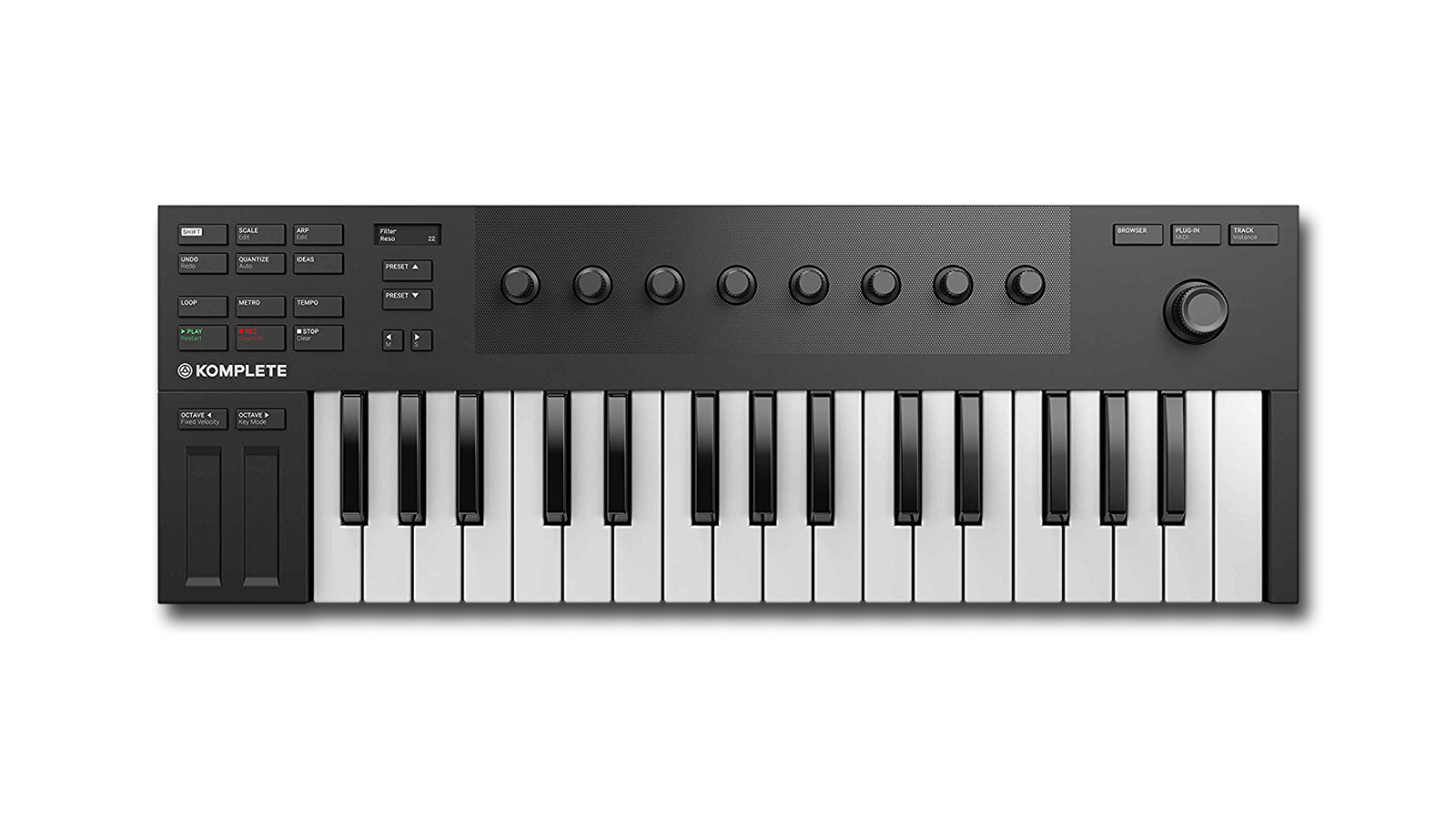
Specifications
Reasons to buy
Reasons to avoid
✅ Buy if you're using Komplete: If you're already part of the Native Instruments ecosystem, the Komplete Kontrol M32 is the ideal option for integrating with your existing software.
❌ Avoid if you want drum pads: This MIDI keyboard doesn't feature any drum pads, so avoid if you like to play your beats in.
Native Instruments’ Komplete Kontrol brand is an industry-leading range of software and hardware devices. The opportunity to buy into it at such a bargain price with the Komplete Kontrol M32 MIDI controller is therefore very tempting indeed.
The M32’s solid, slab-like profile just oozes quality, continuing the flat, black design signature of the rest of the NI range. The M32 sports more keys than most of its mini-keyed peers - 32 instead of 25 - spanning 2.5 octaves from F2 to C5
As a bonus, the bundled software includes Maschine Essentials, the entry-level version of NI’s acclaimed Maschine software. However, like the larger A-series keyboards, the M32 is also fully capable of controlling the full version of Maschine.

"The M32 is astonishingly successful in its realisation of an on-the-go Komplete Kontrol. Sure, those tiny keys aren’t as playable as their full-size counterparts, and aftertouch isn’t supported, but when you’re sitting in a cafe or on the beach, busting out basslines in Massive, you just won’t care - it’s ace. "
Best 49-key
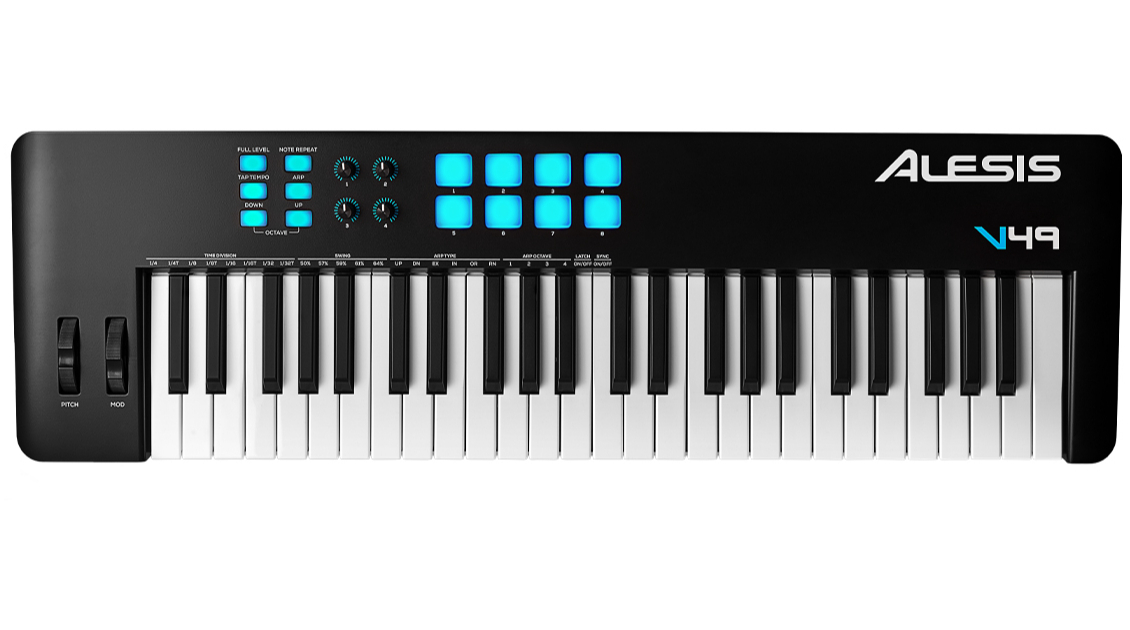
6. Alesis V49 MKII MIDI keyboard
Our expert review:
Specifications
Reasons to buy
Reasons to avoid
✅ Buy if you want more keys: With 49 keys, the V49 MkII allows 'proper' players to get a little more expansive with their chords whilst on a tight budget.
❌ Avoid if you want DAW control: There are precious few encoders and rotary knobs here, so look elsewhere if you like to control your DAW with your controller.
The Alesis V49 MKII MIDI controller offers a decent balance of full-size, firmly-sprung, synth-action keys and assignable hardware controls for not a lot of money at all - making it a great contender for the best cheap MIDI keyboard.
This newly redesigned keyboard sees substantial changes in the layout of the extra controls. Where the original placed its additional controllers – a set of eight pads, function buttons, pitch bend and modulation wheels and four rotary encoders – to the left-hand side, making for a wide, thin instrument, the MKII opts for a more traditional configuration.
Want to use your new MIDI controller to make beats? Well, you are in luck! The Alesis V49 MKII comes bundled with the incredibly easy to use MPC Beats music production software.

"There’s a greater emphasis on performance from the V49 MkII, as there are functions here to trigger your imagination in more musical ways than before. The downloadable Editor provides a graphic interface to manage current controller assignments and settings, whilst the bundled software includes an MPC Beats bundle, with seven Beats Expansion Packs."
Read more: Alesis V49 MkII review
Also consider
So those are our top picks, but there are may more great options to choose from that offer something a little different in terms of features and performance. We've selected some more of our favourites below.
M-Audio Oxygen 49 MKV
49 full-size keys | USB bus power | 2.9kg
Now in their fifth iteration, M-Audio’s Oxygen MIDI controllers have always been popular, all three versions (25, 49, and 61-key) offering a great compromise between features, key range, and price. With an impressive array of knobs, buttons, sliders, dedicated DAW transport controls, and eight premium-feel drum pads, this compact yet powerful MIDI controller should have you covered and then some.
★★★★½
Read more: M-Audio Oxygen 49 MKV review
Korg Microkey2 Air-25
25 mini keys | USB bus power | 1kg
Korg’s MicroKey MIDI controller range has long been popular with musicians on the move. The MicroKey Air builds on the success of the original and adds wireless connectivity via Bluetooth for an even more portable solution. The 25-note version shown here packs a decent octave range into a slim profile for relatively little money, although there are also 37, 49, and even 61-note versions available.
★★★★☆
Read more: Korg Microkey Air 25 review
Donner DMK-25 Pro
25 mini keys | USB bus power | 0.68kg
The DMK-25 Pro plays well for a keyboard at this price point and size. You’ll be able to bash out basic chords and melodies with reasonable precision and comfort. Build quality as a whole is acceptably solid. Its plastic chassis likely won’t put up much resistance to heavier forms of wear and tear, but it does weigh very little, helping the DMK deliver on its promise of portability.
★★★½
Read more: Donner DMK-25 Pro review
How to choose
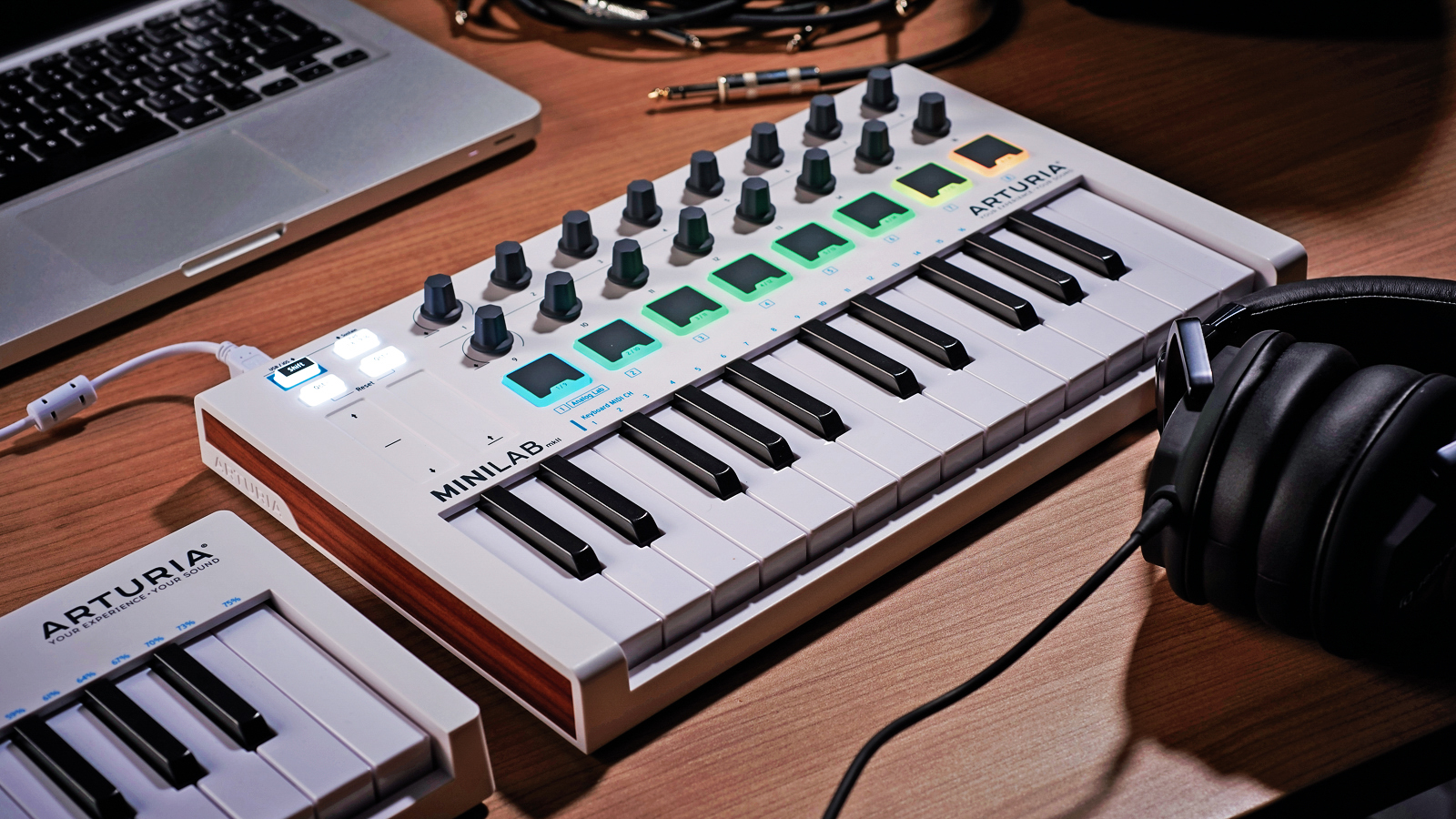
If you're just starting out with keyboards, there are a few things you should be looking for when buying a cheap MIDI keyboard controller. Here we'll list some of the considerations and offer advice on how to build the best studio for your needs.
What is a MIDI keyboard?
MusicRadar's got your back
Simply put, a MIDI keyboard produces no sound on its own and instead is used to control and play sounds from music software or hardware synthesizers. The controller sends MIDI information to the computer - or synth - to tell it what note you played, for how long and how hard you played it. The computer interprets this information and plays it back as audio.
Say you wanted to take full advantage of the virtual instruments found inside your DAW, a MIDI controller would allow you to play them as if you were playing a regular keyboard.
Many MIDI controllers also feature touchpads, which are perfect for performing percussive elements such as drums, pitch wheels for recreating the expressive pitch bends easily achieved on a guitar, and some even have faders that can be linked directly to the mixer in your DAW.
What style of keys do you need?
A MIDI controller can come with several different styles of keys, from full-sized to mini, weighted to synth-action. There are many choices out there - but which is the best for you?
These days, mini keys are just as responsive and easy to play as full-size versions but can be tricky if you suffer from 'sausage finger syndrome', in which case you might want to stick to full-size keys.
Next, you need to think about the action. More affordable MIDI controllers will come with a 'synth-like' action, meaning the keys aren't weighted at all. Now for most of us, that's fine, but experienced piano players may be more familiar with fully-weighted keys. As the name suggests, these keys are weighted and mimic the touch of a piano.
If you find the synth-action too light, but you're struggling with the heavy feel of weighted keys, you may want to look at semi-weighted, which sit somewhere in the middle.
How many keys do you need on a MIDI keyboard?
All of the best cheap MIDI keyboards featured here come with octave shift buttons, meaning that the full range of note pitches are accessible just by pressing a couple of buttons. That said, if you're a more advanced player or want to learn how to play two-handed - and if you have the desk space - it's better to go for a four-octave (49-note) or five-octave (61-note) keyboard.
For absolute beginners, or anyone looking for a quick and easy way of laying down simple patterns, a smaller, 25-key MIDI controller should do just fine. These have the advantage of being cheaper and more portable than their bigger cousins and take up less space on your work surface.
Usually, 61 keys is an excellent choice, as you'll find yourself reaching for the octave up and down button less often. Covering five octaves, 61 keys is usually enough for most situations. That said, those looking to play the controller as if it was a regular piano will want to opt for an 88-note option to ensure they have the entire spectrum of the piano at their fingertips.
Connectivity: what do you need?
It's commonplace in this day and age for all MIDI controllers to work via USB - for sending note information as well as power. However, as more and more producers are opting to work completely 'in-the-box', there isn't always a need for the traditional 5-pin MIDI out - unless you have some hardware MIDI synths to connect it to. That said, it's fairly common for DAW users to want to experiment with external gear as they progress, so a traditional MIDI output is a nice tool to have - better to have it and not need it, than need it and not have it!
Now, if you want to gain even more control over your MIDI keyboard, we'd highly recommend looking for one with a sustain pedal input. This will allow you to connect a piano-like sustain pedal, giving you the ability to play held chords and sustaining lead lines. Of course, it's also a must if you want to play the controller like a traditional piano.
Understanding DAW Integration
Being able to control the transport (play/pause/record) of your DAW and adjust the parameters of your software instruments from your keyboard rather than your computer is always handy.
Full DAW integration comes as a bonus if you're on a budget, however, it's often the preserve of the more expensive end of the market. However, we are seeing more and more controllers ally themselves to a specific DAW, and the instant integration and mapping these controllers offer makes life much easier, at least at the start.
If you know, for example, that you're an Ableton Live user, choosing a controller with dedicated features related to Live does give that instant control and enable you to start making music much quicker.
FAQs
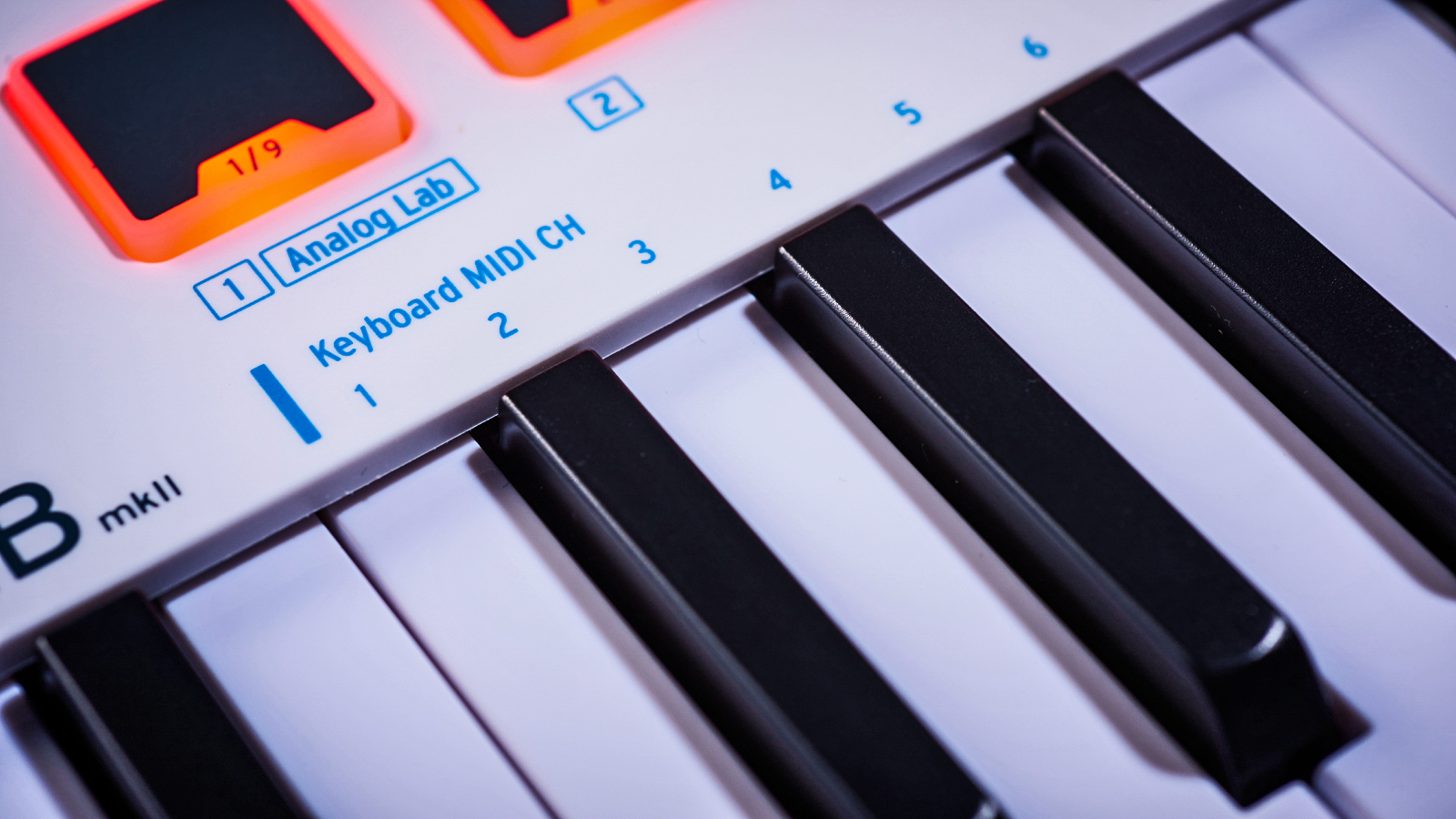
What is a MIDI keyboard used for?
A MIDI keyboard allows you to manipulate software instruments in your DAW, whether that's a VST piano, software synthesizer, or even a VST drum kit. With a laptop, DAW, and MIDI keyboard you'll have the majority of the tools you need to start making music.
Is a MIDI keyboard okay for beginners?
Yes a MIDI keyboard is fine for beginners. We'd actually recommend that all music makers have one in their arsenal, beginner or not. In this guide we've got a specific MIDI keyboard picked out that we think is perfect for beginner music makers, the Akai MPK Mini Mk3.
What is the difference between a MIDI keyboard and a regular keyboard?
A MIDI keyboard won't make any sound on its own, you'll need to plug it into something and use software or an external hardware synthesizer to get it to make any sounds. A keyboard has its own built-in sounds that mean you can use it on its own, although there are keyboards out there with USB and MIDI connectivity which you can use to make music through a computer.
Can I use a MIDI keyboard as a piano?
With the right piano VST software, yes you can use a MIDI keyboard as a piano. Just bear in mind that it will be a very different physical playing experience to that which you'd get from an actual piano. For beginners or those who want to add piano sounds to their recordings, a MIDI keyboard will work just fine.
How we test
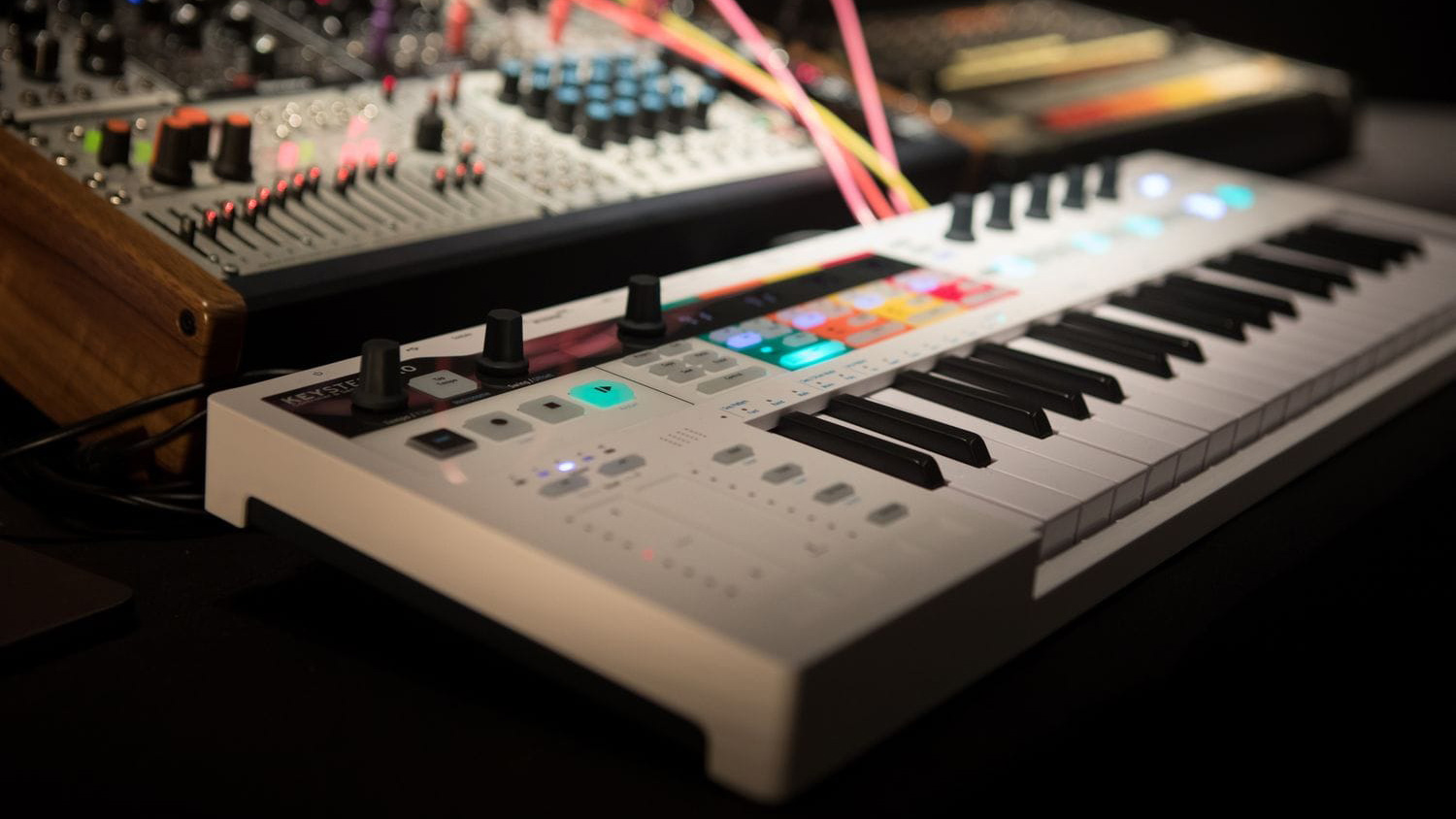
Here at MusicRadar, we are experts in our field, with many years of playing, creating and product testing between us. We live and breathe everything music gear related, and we draw on this knowledge and experience of using products in live, recording and rehearsal scenarios when selecting the products for our guides.
When choosing what we believe to be the best stage pianos available right now, we combine our hands-on experience, user reviews and testimonies and engage in lengthy discussions with our editorial colleagues to reach a consensus about the top products in any given category.
First and foremost, we are musicians, and we want other players to find the right product for them. So we take into careful consideration everything from budget to feature set, ease of use and durability to come up with a list of what we can safely say are the best stage pianos on the market right now.
Find out more about how we test music gear and services at MusicRadar.
Related buyer's guide
- Start creating with the best beginner MIDI keyboards
- These are the best budget audio interfaces
- Our pick of the best audio interfaces for beginners and pros
- These are the best piano VSTs
- Explore the best studio monitor speakers in the world today
- And the best budget studio monitors for recording at home
- Start making music with the best laptops for music production
- Read more: the best MIDI pad controllers
- Invest in the best studio headphones for music makers
Want all the hottest music and gear news, reviews, deals, features and more, direct to your inbox? Sign up here.
Chris Corfield is a journalist with over 12 years of experience writing for some of the music world's biggest brands including Orange Amplification, MusicRadar, Guitar World, Total Guitar and Dawsons Music. Chris loves getting nerdy about everything from guitar and bass gear, to synths, microphones, DJ gear and music production hardware.
- Matt McCrackenJunior Deals Writer
- Andy Jones
- Dave Clews
